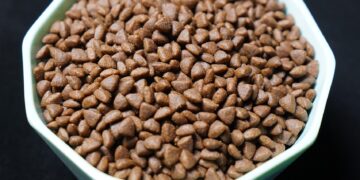Nutrition Secrets for Optimal Dog Wellness
Every dog owner dreams of a happy and healthy pup. The foundation of achieving this lies in understanding and implementing proper nutrition, which can significantly boost your dog’s vitality and longevity. This comprehensive guide will dive into practical and insightful nutrition secrets that ensure your furry friend thrives.
The Cornerstone of Canine Health: Understanding Dog Nutrition
Nutrition plays a crucial role in your dog’s overall health. Dogs, like humans, need a balanced diet filled with nutrients. However, a dog’s nutritional requirements differ markedly from ours. Let’s explore what makes up a good dog diet and how you can tailor it to the needs of your beloved pet.
1. Balancing the Basics: Proteins, Carbohydrates, and Fats
Dogs are not strictly carnivores or omnivores; they fall somewhere in between. This means their diet should consist of a variety of foods.
- Proteins: Essential for muscle growth and repair. Sources include chicken, beef, and plant-based proteins like lentils.
- Carbohydrates: Give energy and come from sources like sweet potatoes and brown rice.
- Fats: Crucial for energy and cell function, with sources including fish oil and flaxseeds.
2. The Role of Vitamins and Minerals
Vitamins and minerals support everything from bone health to nerve function. Multivitamins are often needed to fill any nutritional voids in a dog’s diet, especially for those with specific health needs or older dogs.
3. Hydration: The Silent Nutrient
Water might not contain calories or vitamins, but it’s critical to a dog’s health. Ensuring your dog has constant access to clean water is a simple yet effective step towards optimal wellness.
Feeding Your Dog: Practical Tips and Common Queries
Feeding your dog is not just about what you feed, but also how and when. Here are some actionable tips along with answers to frequently asked questions.
1. Deciphering Dog Food Labels
Choosing the right commercial dog food can be tricky. Look for products labeled as “complete and balanced,” which indicates they meet minimal nutritional requirements set by the Association of American Feed Control Officials (AAFCO). Avoid foods with ambiguous ingredients like “meat by-products” or “animal digest.”
2. Home-Cooked Meals vs. Store-Bought:
While many owners opt for the convenience of kibble, cooking for your dog can have many benefits. It allows full control over the ingredients and avoids preservatives and fillers found in many commercial foods. However, it’s vital to consult with a vet to ensure meals are nutritionally balanced.
3. How Much Should I Feed My Dog?
The amount varies based on age, size, and activity level. An active, large breed dog will require more calories than a small, elderly dog. Adjust portions according to your dog’s health needs and energy output.
Special Nutritional Considerations for Different Dog Breeds and Ages
Just like with humans, a one-size-fits-all approach doesn’t work for dog nutrition. Different breeds and ages have varying dietary needs.
1. Puppies: Building the Foundation
Puppies require diets rich in proteins and fats to support rapid growth and development. Foods should also be calorie-dense to meet their energy demands. Growth formula puppy foods are typically the best options.
2. Adult Dogs: Maintaining Health
For adult dogs, balance is key. Maintenance diets, which are not as calorie-dense as puppy formulas but contain adequate nutrients, are ideal. This is also a good time to introduce health supplements if recommended by your vet.
3. Senior Dogs: Supporting the Golden Years
Older dogs need fewer calories due to decreased activity, but still require protein to maintain muscle mass. Increased fiber can aid digestion, and supplements such as glucosamine can support joint health.
Common Myths and Misconceptions About Dog Nutrition
Let’s clear up some widespread myths that might be complicating your decisions about your dog’s diet.
1. “Grain-free diets are healthier.”
Grain-free diets have become popular based on the myth that grains are bad for dogs. However, unless your dog has a specific allergy, grains like rice and oats are valuable energy sources.
2. “Dogs should only eat raw meat.”
While some advocate for raw diets citing canine ancestry, they can pose health risks like bacterial infections. Properly cooked diets are typically safer and equally nutritious.
3. “More protein always equals better.”
Excess protein can lead to kidney strain in some dogs. Balance and moderation are vital.
Conclusion: Committing to Canine Nutrition
Optimal nutrition is a key element of dog wellness. By understanding your dog’s dietary needs, reading labels carefully, and consulting with professionals, you can provide meals that promote health and happiness. Remember, every dog is unique, and their dietary needs will evolve with their age and health condition. Here’s to a healthy, happy, and well-fed canine companion!














































